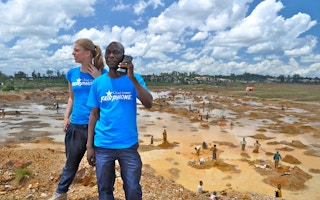The circular economy - a concept which ensures that products are designed with their eventual reuse, upcycling or biodegradation in mind - emerged as the most prominent trend that is driving the innovation of sustainable solutions worldwide, according to Sustainia100, a report released on Monday by Scandinavian think thank Sustainia.
To continue reading, subscribe to Eco‑Business.
There's something for everyone. We offer a range of subscription plans.
- Access our stories and receive our Insights Weekly newsletter with the free EB Member plan.
- Unlock unlimited access to our content and archive with EB Circle.
- Publish your content with EB Premium.
Ensuring more efficient use of water resources, and improving working conditions across supply chains were also among the key global trends that are driving sustainable solutions that have a positive social and economic impact on society.
Sustainia announced these findings along with their third annual Sustainia100 study, which identifies the world’s top 100 sustainability solutions.The organisation worked in partnership with private corporations and international organisations such as the United Nations Global Compact and DNV GL, amongst others, to review over 900 projects across the globe in ten sectors – namely, buildings, food, fashion, transport, information technology, education, energy, health, cities and resources.
All projects were submitted following a call for submissions by Sustaina in early 2014. The final selection included 26 solutions that were developed in emerging economies, and 17 that originated in Asia. All showcased solutions are readily available in markets today, can be scaled up across markets, and have a positive environmental and socio-economic impact on society.
Circular economy thinking was evident in a quarter of all solutions, including Japanese manufacturer Teijin, whose “Eco Circle” recycling process makes it possible to recycle polyester products multiple times without compromising on quality. This process helps reduce carbon dioxide emissions by 77 per cent compared to new polyester made by petroleum, according to Teijin.
Laura Storm, director of Sustainia, commented: “We are seeing how especially the circular economy is a growing focus area. Companies re-think consumption, waste, materials and return-systems at impressive scale”.
“The global pressure on our natural resources has led to increased resource scarcity, which calls upon industries to transform their way of operating. Clever use of materials is a key innovation driver,” she added.
The need for water efficiency also influenced 16 out of the 100 showcased solutions promoted water efficiency, particularly within the fashion and food sectors.
“
While we don’t have the luxury of time to fix the problems, we do have the luxury of readily available solutions. And with Sustainia100, we now know where to find the most inspiring of them.
Rajendra Pachauri, chairman, Intergovernmental Panel on Climate Change
Israeli firm Netafim, for example, offered a low-technology, gravity-based irrigation system that helps farmers reduce water usage, and improve crop quality and yield. The system delivers precise quantities of water from an elevated tank directly to the root zone of crops. The use of gravity to distribute water minimises the need for electricity and new infrastructure, while drip irrigation technology itself can yield water savings of up to 60 per cent. Netafim’s solution has been successfully deployed in 11 countries globally, including Kenya, China and Mexico.
Sustaina’s report also identified 14 solutions that addressed responsible supply chains. Initiatives to integrate the needs of local communities, and using technology to monitor working conditions were among these solutions.
The ‘Fairphone’ for example, is a socially responsible mobile phone, jointly developed by China, the Netherlands and Portugal. Free of conflict minerals and made by workers who earn fair wages, the product sold out its initial production run of 25,000 pieces, highlighting a strong market for ethical products, said the report.
All the showcased solutions, says Sustaina, give investors, business leaders, politicians and consumers in-depth insights into projects and technologies in their respective sectors.
Storm noted, “We are seeing how corporations are rapidly innovating and deploying new energy and resource-optimizing solutions. With this development, companies will lag behind if they do not gear towards a changed landscape, where an efficient and sustainable operation is key to long-term survival“.
The fact that these solutions are readily available and have proven to be financially and technologically scaleable has also been praised by sustainability experts.
Rajendra Pachauri, chair of the Intergovernmental Panel on Climate Change (IPCC), said of the report: “While we don’t have the luxury of time to fix the problems, we do have the luxury of readily available solutions. And with Sustainia100, we now know where to find the most inspiring of them”.
“The scientific knowledge provided by the IPCC needs to be converted into a set of options which the non-specialist public should be able to understand easily and implement”, he added. “This is what [this study] has done very well”.
“There are reasons for optimism”, he said.
In order to scale up the uptake of these innovative solutions in Asia’s emerging economies, Storm told Eco-Business, clear communication on the potential of these products was essential.
“The documentation for why sustainable practice is good business is plentiful. The challenge is to communicate these arguments and give companies easy access and overview of market-ready innovation”, she said.








